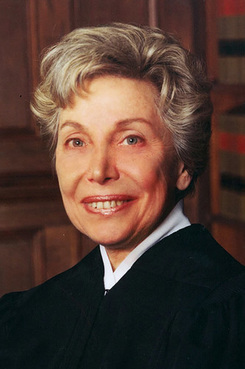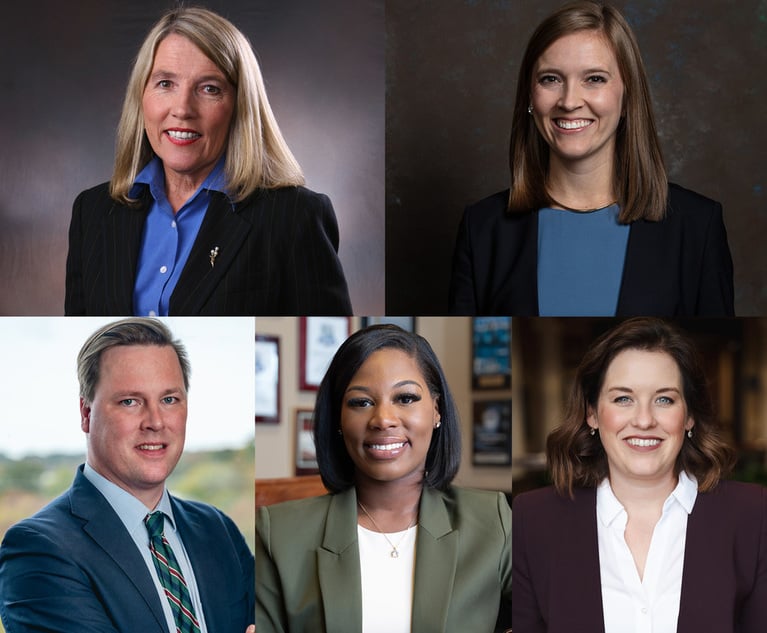This Story Tops All Others in the Female Judge Mix-up Genre
It was one of several told by the late federal circuit court Judge Phyllis Kravitch.
February 06, 2019 at 10:40 AM
3 minute read
 Judge Phyllis Kravitch, U.S. Court of Appeals for the Eleventh Circuit (Courtesy photo)
Judge Phyllis Kravitch, U.S. Court of Appeals for the Eleventh Circuit (Courtesy photo)It's been 91 years since a woman was first named to the federal bench, but the idea of female judges continues to flummox an unfortunate few.
As ALM journalists in Miami and New York have reported in recent days, women jurists still endure the occasional faux pas—lawyers confusing them with clerks or someone saying after introductions, “You don't look like a judge.”
But the late Judge Phyllis Kravitch of the U.S. Court of Appeals for the Eleventh Circuit may have experienced the best female judge mix-up story in history.
Kravitch, who died in 2017 at age 96, was initially on the Fifth Circuit before Georgia, Florida and Alabama were carved out to create the Eleventh Circuit.
Early in her days on the Fifth Circuit, Kravitch was in New Orleans for oral arguments. It was raining heavily, and she and her staff waited in a long line at a hotel for a taxi. Just as they reached the front of the line, two men cut in front of them, one explaining he had an important engagement.
Kravitch and her staff caught the next cab, and a little while later, she looked down from the bench to see arguing before her … one of the men who commandeered the taxi.
In a 2008 Daily Report profile, Kravitch deflected a question about who won the case. As reported by the newspaper's Alyson M. Palmer, the judge said only that “the lawyer appeared nervous and didn't do well.”
In a 2009 article about an appearance by Kravitch at a legal community event, Palmer reported the judge regaled the crowd with more stories, including this one.
Not long after Kravitch became Georgia's first female superior court judge, President Jimmy Carter's nominating commission for the Fifth Circuit summoned her to the federal courthouse in Atlanta for an interview.
Kravitch recalled arriving early and a secretary telling her someone would be by to retrieve her in a few minutes. After the secretary stepped out, a man from Mississippi came by. He asked if Kravitch might bring a pot of coffee into the courtroom.
“I said, 'Well, I don't know where they keep the coffee here, but if you'll show me, I'll do my best.' He said, 'Don't you work here?' I said, 'No, I was just waiting for an appointment.'”
A little later, the commission chairman came to get her, brought her into the courtroom where the commission was meeting and introduced her to the other members, including the man whom Kravitch referred to as “the coffee gentleman.”
“I said, 'Oh, I think we've met.'”
The man's face turned red. “I think I owe Judge Kravitch an apology and the rest of you an explanation,” she recalled the man responded. He tried to explain his mistake and received a lecture about stereotypes from a female member of the commission, Kravitch recalled.
She said she was glad it happened.
“Because he didn't ask the first question,” she recalled, “and it broke the ice as far as I was concerned.”
This content has been archived. It is available through our partners, LexisNexis® and Bloomberg Law.
To view this content, please continue to their sites.
Not a Lexis Subscriber?
Subscribe Now
Not a Bloomberg Law Subscriber?
Subscribe Now
NOT FOR REPRINT
© 2025 ALM Global, LLC, All Rights Reserved. Request academic re-use from www.copyright.com. All other uses, submit a request to [email protected]. For more information visit Asset & Logo Licensing.
You Might Like
View All

Plaintiffs Attorneys Awarded $113K on $1 Judgment in Noise Ordinance Dispute
4 minute read
'Didn't Notice Patient Wasn't Breathing': $13.7M Verdict Against Anesthesiologists
12 minute readTrending Stories
- 1No Two Wildfires Alike: Lawyers Take Different Legal Strategies in California
- 2Poop-Themed Dog Toy OK as Parody, but Still Tarnished Jack Daniel’s Brand, Court Says
- 3Meet the New President of NY's Association of Trial Court Jurists
- 4Lawyers' Phones Are Ringing: What Should Employers Do If ICE Raids Their Business?
- 5Freshfields Hires Ex-SEC Corporate Finance Director in Silicon Valley
Who Got The Work
J. Brugh Lower of Gibbons has entered an appearance for industrial equipment supplier Devco Corporation in a pending trademark infringement lawsuit. The suit, accusing the defendant of selling knock-off Graco products, was filed Dec. 18 in New Jersey District Court by Rivkin Radler on behalf of Graco Inc. and Graco Minnesota. The case, assigned to U.S. District Judge Zahid N. Quraishi, is 3:24-cv-11294, Graco Inc. et al v. Devco Corporation.
Who Got The Work
Rebecca Maller-Stein and Kent A. Yalowitz of Arnold & Porter Kaye Scholer have entered their appearances for Hanaco Venture Capital and its executives, Lior Prosor and David Frankel, in a pending securities lawsuit. The action, filed on Dec. 24 in New York Southern District Court by Zell, Aron & Co. on behalf of Goldeneye Advisors, accuses the defendants of negligently and fraudulently managing the plaintiff's $1 million investment. The case, assigned to U.S. District Judge Vernon S. Broderick, is 1:24-cv-09918, Goldeneye Advisors, LLC v. Hanaco Venture Capital, Ltd. et al.
Who Got The Work
Attorneys from A&O Shearman has stepped in as defense counsel for Toronto-Dominion Bank and other defendants in a pending securities class action. The suit, filed Dec. 11 in New York Southern District Court by Bleichmar Fonti & Auld, accuses the defendants of concealing the bank's 'pervasive' deficiencies in regards to its compliance with the Bank Secrecy Act and the quality of its anti-money laundering controls. The case, assigned to U.S. District Judge Arun Subramanian, is 1:24-cv-09445, Gonzalez v. The Toronto-Dominion Bank et al.
Who Got The Work
Crown Castle International, a Pennsylvania company providing shared communications infrastructure, has turned to Luke D. Wolf of Gordon Rees Scully Mansukhani to fend off a pending breach-of-contract lawsuit. The court action, filed Nov. 25 in Michigan Eastern District Court by Hooper Hathaway PC on behalf of The Town Residences LLC, accuses Crown Castle of failing to transfer approximately $30,000 in utility payments from T-Mobile in breach of a roof-top lease and assignment agreement. The case, assigned to U.S. District Judge Susan K. Declercq, is 2:24-cv-13131, The Town Residences LLC v. T-Mobile US, Inc. et al.
Who Got The Work
Wilfred P. Coronato and Daniel M. Schwartz of McCarter & English have stepped in as defense counsel to Electrolux Home Products Inc. in a pending product liability lawsuit. The court action, filed Nov. 26 in New York Eastern District Court by Poulos Lopiccolo PC and Nagel Rice LLP on behalf of David Stern, alleges that the defendant's refrigerators’ drawers and shelving repeatedly break and fall apart within months after purchase. The case, assigned to U.S. District Judge Joan M. Azrack, is 2:24-cv-08204, Stern v. Electrolux Home Products, Inc.
Featured Firms
Law Offices of Gary Martin Hays & Associates, P.C.
(470) 294-1674
Law Offices of Mark E. Salomone
(857) 444-6468
Smith & Hassler
(713) 739-1250







